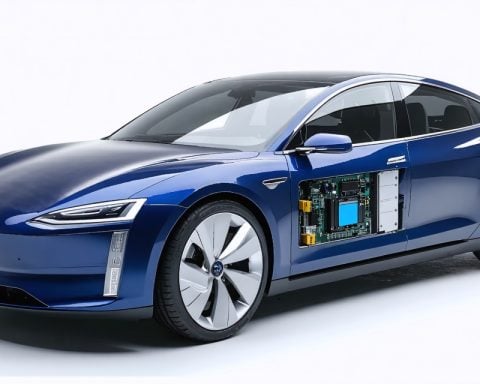Explosive Growth in Electric Vehicle Sales
In December 2024, automakers experienced a remarkable boost in electric vehicle (EV) sales. A significant surge was fueled by substantial discounts on select models, contributing to record-breaking sales figures as interest in electric alternatives soared, alongside hybrids and plug-in hybrids.
A recent report highlights that government incentives played a crucial role in driving the sales jump, especially in China, where over 11 million EVs were sold last year alone. Overall, more than 17 million electric vehicles left showrooms worldwide, showcasing China’s dominance in the global market.
December alone witnessed nearly 1.9 million electrified vehicles sold, emphasizing the month’s importance for the industry. North America’s EV sector also finished on a positive note, with an estimated 8.8% increase in sales, translating to approximately 190,000 cars sold in December. Meanwhile, Europe maintained its upward trajectory with 310,000 electric vehicles sold, marking a modest growth of 0.7%.
However, as optimism for 2024 wanes, experts suggest that the outlook for 2025 is clouded. Countries like Canada and Germany have recently terminated their government incentive programs, potentially stifling future sales. Furthermore, the political landscape in the U.S. could significantly impact the EV market, raising concerns about the sustainability of its current growth trajectory. As 2025 approaches, the EV industry faces complex challenges ahead.
Surging Electric Vehicle Sales: A Path to Sustainable Future
The recent surge in electric vehicle (EV) sales, marked by record numbers in December 2024, reflects a significant shift in the automotive industry that carries broader implications for the environment, humanity, and global economies. With over 17 million EVs sold worldwide in a single year, a feat heavily influenced by government incentives and growing consumer interest, this trend not only signifies a victory for clean energy but also highlights the interconnectedness of technological innovation and environmental stewardship.
The environmental impact of the expanding EV market is profound. Electric vehicles are fundamentally designed to reduce greenhouse gas emissions compared to traditional gasoline and diesel vehicles. As the automotive sector pivots towards electrification, the potential for reduced air pollution becomes tangible, leading to improved air quality in urban areas and contributing to global efforts to combat climate change. Enhanced EV adoption can significantly decrease reliance on fossil fuels, thus mitigating the ecological footprint associated with fossil fuel extraction and consumption. By aligning consumer behavior with sustainable practices, we pave the way for a healthier planet.
Beyond environmental considerations, the rise in EV sales profoundly influences humanity’s social fabric. The burgeoning EV market can facilitate the creation of numerous job opportunities in manufacturing, supply chain logistics, and charging infrastructure development. As countries grapple with transitioning from fossil fuels, investments in EV-related sectors could spur regional economic growth, thus providing livelihoods for millions. However, as seen with the fluctuating government incentives in places like Canada and Germany, the continuity of these economic benefits is fragile, reliant on political will and public policy.
Economically, the explosive growth of the EV market is intertwined with the future landscape of the automobile industry. As manufacturers pivot their production lines to meet the surging demand for electric alternatives, traditional automotive jobs may evolve, requiring new skill sets in engineering and technology. The automotive supply chain will also adapt, shifting from conventional parts to those designed for electric drivetrains. This transformation could lead to significant changes in global trade patterns, impacting economies reliant on oil exports while stimulating new industries in battery manufacturing and renewable energy.
Looking ahead, the future of humanity is closely linked to the trajectory of electric vehicles. The industry’s growth is a double-edged sword—while it promises a greener tomorrow, challenges loom regarding infrastructure development and sustainable sourcing of battery materials. The recent slowdown in EV sales caused by policy changes in key markets evokes concern that growth may falter without consistent support for clean energy investment.
In summary, the recent upswing in electric vehicle sales signals a crucial advancement toward a sustainable future, replete with benefits for our environment, economies, and societies. To harness this momentum, concerted efforts will be needed from governments, businesses, and consumers alike to ensure the ongoing viability of electric vehicles in the face of economic and political uncertainties. As we navigate the complexities of the future, the collective commitment to sustainable practices will define the world we leave for generations to come.
Electric Vehicle Sales Skyrocket: A Comprehensive Analysis of Trends and Future Prospects
Explosive Growth in Electric Vehicle Sales
The electric vehicle (EV) market has witnessed an unprecedented surge, particularly in December 2024, when sales figures hit astounding levels due to significant consumer interest and strategic pricing. As automakers implemented substantial discounts on select models, buyers flocked to showrooms, leading to record-breaking EV sales not just in China but globally.
Current Trends in Electric Vehicle Sales
According to recent statistics, over 17 million electric vehicles were sold worldwide in 2024. Notably, China continued to lead the global market, contributing more than 11 million of these sales. The surge in EV popularity has been significantly attributed to government incentives aimed at promoting cleaner transportation alternatives, with December alone accounting for nearly 1.9 million electrified vehicles sold globally.
In North America, the electric vehicle sector experienced a positive end to the year with an 8.8% increase in sales, which translates to around 190,000 cars sold in December. This growth aligns with increasing commitments toward sustainability and a growing infrastructure for EV support.
In Europe, the market also recorded progress, albeit at a slower pace, with 310,000 electric vehicles sold and an overall growth rate of 0.7%. The contrasting growth rates across regions highlight a diverse landscape in EV adoption strategies and consumer engagement.
Limitations and Challenges Ahead
Despite the triumphs in 2024, the outlook for 2025 presents several hurdles. Countries like Canada and Germany have recently concluded their government incentive programs, which may dampen future sales momentum. Without these subsidies, potential buyers may hesitate to invest in EVs, impacting overall market growth.
Moreover, the evolving political landscape in the U.S. poses additional uncertainties. Regulatory changes or shifts in public policy could profoundly affect consumer behavior and manufacturer strategies, leading to concerns about the sustainability of the recent growth trends.
Pros and Cons of Electric Vehicles
Pros:
– Environmental Benefits: EVs produce zero tailpipe emissions, contributing significantly to reduced air pollution.
– Lower Operating Costs: With fewer moving parts, EVs typically have lower maintenance costs compared to traditional gasoline vehicles.
– Government Incentives: Many countries still offer incentives, rebates, and tax breaks for electric vehicle buyers.
Cons:
– Range Anxiety: Some consumers are concerned about the driving range of electric vehicles, although advancements are continually improving this aspect.
– Charging Infrastructure: Access to charging stations can be limited in certain areas, complicating long-distance travel.
– Initial Cost: The upfront price of electric vehicles can often still be higher than that of conventional cars, despite lower running costs.
Key Innovations in the Electric Vehicle Market
1. Battery Technology Advancements: Innovations such as solid-state batteries promise increased range and shorter charging times, potentially revolutionizing the EV space.
2. Autonomous Driving Features: Many new electric models are being equipped with self-driving technology, creating safer and more efficient transportation options.
3. Sustainability in Production: Automakers are investing in sustainable manufacturing processes, reducing the carbon footprint associated with EV production.
Predictions for the Electric Vehicle Market
As sustainability becomes a core focus for industries across the globe, the electric vehicle market is expected to remain a strong player. Many analysts predict continued sales growth in the coming years, provided that supportive policies are maintained and that infrastructure improves. The integration of innovative technologies, coupled with growing consumer awareness of environmental impacts, marks a promising future for electric vehicles.
For more information on electric vehicles and market trends, visit The Verge.













